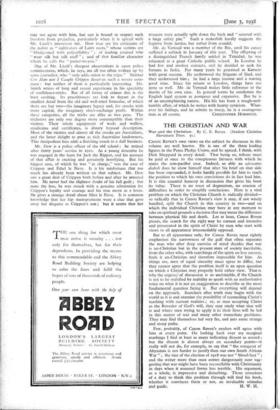THE CHRISTIAN AND WAR
War and the Christian. By C. E. Raven. (Student Christian Movement Press. 5s.)
CANON RAVEN'S own views on the subject he discusses in this volume are well known. He is one of the three leading figures in the Peace Pledge Union, and he agreed, I think, with Dick Sheppard in every detail. That being so, tribute must be paid at once to the conspicuous fairness with which he states the non-pacifist case. Indeed, so able an advocatus diaboli does he show himself that after his brief on that side has been expounded, it looks hardly possible for him to reach the position to which his own convictions do in fact lead him. It is this essential honesty in discussion that gives his book its value. There is no trace of dogmatism, no evasion of difficulties in order to simplify conclusions. Here is a vital problem on which the Christian Church is radically divided— so radically that in Canon Raven's view it may, if not wisely handled, split the Church in this country in two—and on which the individual Christian may have at any moment to take on spiritual grounds a decision that may mean the difference between physical life and death. Let at least, Canon Raven pleads, the search for the right way be earnest and intensive and prosecuted in the spirit of Christ by men who start with views to all appearance irreconcilably opposed.
But to all appearance only, for Canon Raven most rightly emphasises the narrowness of the gulf that often separates the man who after deep exercise of mind decides that war is un-Christian but in the present state of society inevitable, from the other who, with searchings of the spirit no less earnest, finds it un-Christian and therefore impossible for him. As things are, men of equal sincerity must agree to differ, but they cannot agree that the problem itself is an open question on which a Christian may properly hold either view. That is why the urgency of discussion is so undeniable, if the Church is not to be stultified by inability to speak with an authoritative voice on what it is not an exaggeration to describe as the most fundamental question facing it. But everything will depend on the approach. Searchers after truth may begin with the world as it is and examine the possibility of reconciling Christ's teaching with current realities ; or, as men accepting Christ as the Revealer of God's will, they may study what that will is and where men trying to apply it in their lives will be led in this matter of war and many other immediate problems. They may find themselves led very far, and into some strange and stony paths.
Few, probably, of Canon Raven's readers will agree with him at every point. On looking back over my marginal markings I find at least as many indicating dissent as accord ; but the dissent is almost always on secondary points—it really will not do, for example, to say that " the conquest of Abyssinia is not harder to justify than our own South African War " ; the vice of the election of 1918 was not " blood-lust " ; and the writer more than once comes dangerously near sug- gesting that war might have been reconcilable with Christianity in days when it assumed forms less terrible. His argument, as a whole, is impressive and disturbing. Those conscious of a duty to think this problem through will find his book, whether it convinces them or not, an invaluable stimulus


















































 Previous page
Previous page